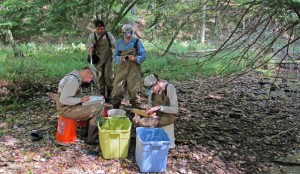
Richard Horwitz (center in blue) and his crew identify samples at a stream in north central Pennsylvania.
Susan Phillips / State Impact Pennsyvlania


Richard Horwitz (center in blue) and his crew identify samples at a stream in north central Pennsylvania.
Susan Phillips / State Impact Pennsyvlania

Susan Phillips / State Impact Pennsyvlania
Richard Horwitz (center in blue) and his crew identify samples at a stream in north central Pennsylvania.

Susan Phillips / State Impact Pennsyvlania
Richard Horwitz (center in blue) and his crew identify samples at a stream in north central Pennsylvania.
“They are struggling to not appear biased so many of them won’t take industry funding,” said Schrauth. “Many of them are concerned about how to get funding for this work that is independent of the industry. So we’ve had some questions about that internally. What is the role of the philanthropic dollar?”
Richard Horwitz says he’s used industry funding in the past, and does not consider it “dirty.” But he says for the Marcellus Shale, he stays away from industry dollars.
“This is controversial enough that if we find something big, we expect the results to be looked over with a fine tooth comb,” said Horwitz. “We really want to dot our I’s and cross our T’s and really do a very thorough job of documenting what we’re doing and making sure that we can demonstrate first, that we aren’t biased and second that it’s good science.”
Who pays for what can get tricky. One institution that has garnered a lot of criticism for taking industry funding is Penn State University, which some activists accuse of acting as a cheerleader for Marcellus Shale drilling.
A recent jobs study by the university was funded by the Marcellus Shale Coalition, an industry group. But a program to put together a surface water database got funding from the National Science Foundation.
Michael Arthur is a professor of geo-science at Penn State and the head of the Marcellus Center for Outreach and Research, which takes no industry money. But Arthur says he does take industry money for some of his own research. He says the industry grants help his students.
“And lest you say well yeah, but you got this widget in your lab and its paid for with industry money,” said Arthur. “And I’ll say yep, it’s there and its being used for research beyond what industry was interested in and the students are trained on modern techniques that they otherwise wouldn’t have access too because no one was going to buy that for us.”
But Arthur says he’s careful not to take industry money for research that looks at controversial gas drilling practices, like his work on how methane leaks into private water wells.
“The research I’m involved in, the stray gas, that’s not industry funded,” he said. I wouldn’t take industry money for that at this point. But the geology of the Marcellus Shale and its geochemistry and its hydrocarbon potential, these are areas I do work with and that’s primarily funded by industry.”
Industry spokespeople say they’re committed to good science, that their companies are primarily staffed by scientists, and they feel that when it comes to the Marcellus, there’s bias on the other end.
Travis Windle is a spokesman for the Marcellus Shale Coalition, a group that includes about 95 percent of the companies drilling in Pennsylvania. Windle says several studies on gas drilling’s impact on water supplies were slanted against the industry.
But he says gas companies do respond to good science.
“A perfect example is how we proactively dealt with the wastewater discharge,” said Windle.
Up until last spring, drillers had been sending wastewater to poorly equipped municipal water treatment facilities, which discharged it into Pennsylvania’s rivers and streams.
“Now, because of some straightforward science and facts put forth by some Carnegie Mellon researchers, we said we were going to unilaterally as an industry stop these practices,” said Windle. We did that, we worked with the DEP to do it, and it was a monumental environmental achievement.”
Back in the forest, Richard Horwitz’s team is trying to figure out what gas drilling’s impact on aquatic life might be, even when drillers follow all the rules. But he expects the results may be disputed. “Whatever answer we come up with, there may be people who assume we were bought off,” Horwitz said.
In Harrisburg, lawmakers are putting together new legislation about natural gas drilling to consider next session. But they won’t have the good science from Horwitz and his crew until the end of 2012.
StateImpact Pennsylvania is a collaboration among WITF, WHYY, and the Allegheny Front. Reporters Reid Frazier, Rachel McDevitt and Susan Phillips cover the commonwealth’s energy economy. Read their reports on this site, and hear them on public radio stations across Pennsylvania.
(listed by story count)
StateImpact Pennsylvania is a collaboration among WITF, WHYY, and the Allegheny Front. Reporters Reid Frazier, Rachel McDevitt and Susan Phillips cover the commonwealth’s energy economy. Read their reports on this site, and hear them on public radio stations across Pennsylvania.
Climate Solutions, a collaboration of news organizations, educational institutions and a theater company, uses engagement, education and storytelling to help central Pennsylvanians toward climate change literacy, resilience and adaptation. Our work will amplify how people are finding solutions to the challenges presented by a warming world.